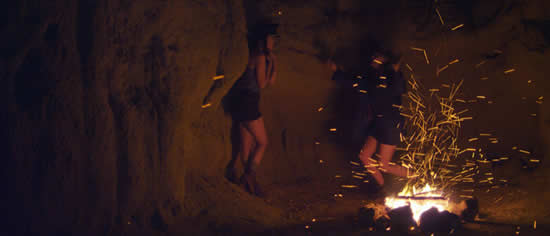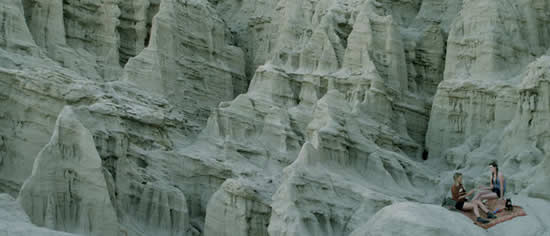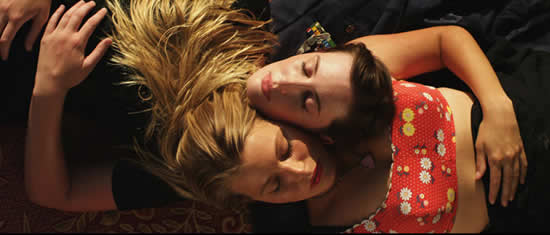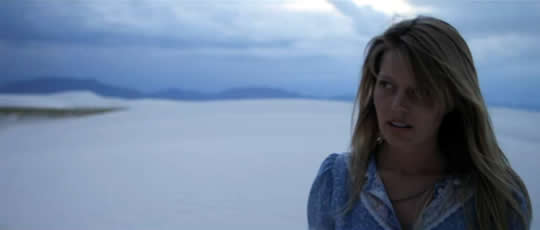 Drew Denny’s first feature film is an adaptation of a performance artwork she presented on Father’s Day 2011 in memory of her dad. Shot on super 16mm and digital, The Most Fun I’ve Ever Had With My Pants On follows two childhood girlfriends Andy and Liv who reunite to scatter Andy’s dad’s ashes from LA to Austin where Liv will audition for the role of a vixen spy in a noir film. Between performing mini-funerals in surreal southwestern landscapes, the girls practice being bad! Hilarious dialog, military cross-dressing, an incredible underground soundtrack, and performances by Sarah Hagan (Freaks and Geeks, Buffy the Vampire Slayer) and writer/director Drew Denny elicit lots of laughter and a few tears in this mixed media dark comedy that interweaves autobiography, documentary, fiction and camp.
Drew Denny’s first feature film is an adaptation of a performance artwork she presented on Father’s Day 2011 in memory of her dad. Shot on super 16mm and digital, The Most Fun I’ve Ever Had With My Pants On follows two childhood girlfriends Andy and Liv who reunite to scatter Andy’s dad’s ashes from LA to Austin where Liv will audition for the role of a vixen spy in a noir film. Between performing mini-funerals in surreal southwestern landscapes, the girls practice being bad! Hilarious dialog, military cross-dressing, an incredible underground soundtrack, and performances by Sarah Hagan (Freaks and Geeks, Buffy the Vampire Slayer) and writer/director Drew Denny elicit lots of laughter and a few tears in this mixed media dark comedy that interweaves autobiography, documentary, fiction and camp.
Bijan Tehrani: How much did your father passing away encourage you to make this film and were there some memories from your life and from him in the film?
Drew Denny: I wrote the film after caring for my dad as he died from pancreatic cancer…
I was in an airplane flying home from an artist residency to visit my father. When I landed, he called me and said, “I’ve been diagnosed with pancreatic cancer and I have three weeks to live.” I went to him that day and he died three weeks later exactly.
Living in the same room with him in the cancer hospital, sleeping on the floor with my sister the night he died, watching someone go from being a seemingly perfectly healthy person then three weeks later being absolutely destroyed –- pancreatic cancer one of the most aggressive and fastest-acting forms of cancer… That experience was terrifying, but also incredibly motivating. It made me want to live.
A lot of the stories embedded in the film are true- the story about my dad getting kicked out of college for sleeping with the dean’s daughter, going to a Mormon University, the Mormons saving my grandma… these are all true stories. And that’s really my dad singing in White Sands! There are a few true stories from my own life woven in, but for the most part my character is made up… so my dad plays my dad, so to speak, but I play a different daughter he might have had.
BT: Your film has a new style, a new way of filmmaking that has nothing to do with Hollywood. Tell me a little bit about the style of your filmmaking
DD: Since graduating from film school, I’ve been working in performance artwork and music. My access to filmmaking was through performance, and this story is very personal so there really was very little distance between my self and the material, which made the process of making this film a very internal, introspective process.
I wanted to purposefully avoid many of the conventions I knew audiences would expect… For example, we start the story in the middle of it, and we end without grand resolution. I wanted to construct a very honest representation of the way I was feeling after my father passed away… this roller coaster between feeling completely ecstatic, loving life, running wild and thinking -I’m so lucky to be alive!- and this really lonely feeling… Encountering the absurdity of death can instill a fear in you—Once I experienced my father’s life ending without resolution, I wanted to counter the myth of resolution with a celebration of the journey. Things don’t necessarily get resolved. In this story, neither of the girls get what they want per se. Life can’t be about a resolution or a product. At least, my life won’t be.
It’s not that I wanted to leave audiences frustrated- quite the opposite. I wanted to demonstrate that even if you don’t get what you want, you can still take the bull by the horns. When the girls go back into the casting office and do it their way, when they say ‘fuck you’ to the establishment and to the expectations that were placed upon them, that’s my manifesto about life. There are moments when things are not going to work out and the best thing you can do is celebrate who you are and the love and the friendships that you have, the life that you have – and that can be a radical act.
 In terms of the content, that was the message I wanted to portray. A lot of people I who reading the script asked “why don’t you just make it have a happy ending?”, “what are they doing going crazy in this casting office?” I was very adamant that I wanted to have this absurdist celebration rather than a nice neat tying up of all the desires, because that is how I was feeling at the time and, while I see now so many things I could have done better, this version of the story is a faithful representation of my ideology.
In terms of the content, that was the message I wanted to portray. A lot of people I who reading the script asked “why don’t you just make it have a happy ending?”, “what are they doing going crazy in this casting office?” I was very adamant that I wanted to have this absurdist celebration rather than a nice neat tying up of all the desires, because that is how I was feeling at the time and, while I see now so many things I could have done better, this version of the story is a faithful representation of my ideology.
In terms of our formal experimentation, for me it was very important to combine scripted scenes with totally improvised moments, to put ourselves out in the natural environment and see what would happen… Sometimes I would have to change the script because a monsoon would come and the lightning would strike, and we’d work that into the movie. That process of roving around, taking a 65 pages script and coming up with a 95 minute movie was a very liberating process.
I’m honored that you recognize our attempt to break away. As a storyteller, I want to foster a very personal, feminine, collective perspective. We credit folks at the beginning of the film without giving anyone a job title. It’s my personal story but it was made by a group of people. I’m working against this idea of ownership that is so pervasive in Hollywood, and I’m trying to allow for a more inclusive perspective.
BT: I think there is something about being from Austin. As opposed to Texas in general being a very conservative state, Austin is very liberal. A person being surrounded by liberal or democratic ideas will shine more and have more to show there. Does it have anything to do with your work?
DD: Absolutely! Coming from the most liberal place in Texas is a very interesting context. To be clear, I didn’t live there as a child. I moved there when I was 13. I was a runaway from a more conservative part of Texas but I went to high school in Austin, lived on my own and ended up graduating from this little hippie school with six people in each grade where we didn’t wear shoes and called our teachers by their first names. As a child I was actually in a super conservative environment: I went to evangelical summer camp, I had to go to church every morning in school, surrounded by fundamentalist born again Christians and hardcore Catholics. At 12, I was told I was going to hell because of my sexuality. I was told a lot of things about what it meant to be a woman and none of them sounded good to me. So from a very young age, I was made to feel bad about who I was. I was told to apologize to Jesus for kissing my girlfriend. What I thought was a beautiful expression of love was apparently a condemnation to eternity in hell. 
So having that primary experience and then finding Austin and its music scene and art scene as a teenager when I was trying to find myself- that was an incredible experience. I know people from outside of Texas love Austin and they praise it for being so liberal… I find it important to remind people that it is the most liberal place in Texas, but it is still in Texas. When I was in high school, George W. Bush was my governor: that was who we were supposed to look up to to take care of our state and lead us… The first high school I went to was a religious high school, and I was expelled after two months for behaviors that I felt were natural expressions of my personality. The second high school I went to was a public school and being queer as a teenager there was only understood through the lens of how men might enjoy it. So instead of people congratulating you for coming out, you’d get “oh you kiss women? you’re a whore!” The only reference they had for my sexuality was pornography. So even though it’s a progressive town, there are still a lot of conservative people. I felt like I was constantly fighting, constantly rebelling.
Of course, it’s nothing like your experience! I was allowed to express myself. I was made fun of, pushed around, expelled from school for it but I was never made to go to jail for it –I was jailed for being a runaway but I was never jailed for something I wrote or thought. That makes me appreciate the freedom I do have to express myself and voice my opinions, and maybe I do it so passionately because I came from such a conservative place. So spending my teenage years in Austin absolutely colors my work. If I had never left those evangelical summer camps, I don’t know if I… Honestly, I don’t even think I would be alive. I don’t think I could have survived that oppressive environment much longer. I am very thankful for Austin and for the wonderful teachers I had who motivated me to express myself despite how it might be received in my state- and very grateful to the parents of other kids who let me live with their families even if they did think I was going to hell!
 BT: How much did the documentaries you made in your most rebellious stages affect this work?
BT: How much did the documentaries you made in your most rebellious stages affect this work?
DD: Quite a bit. The documentary subjects I’ve researched are the relationship between the sex trade and sweat shop manufacturing in South East Asia and in Central America as well as a cooperatively-run village in Bolivia and the Movement of Landless Workers in Brazil. I can see how it would be hard to see a relationship between these and my film- which is a dark comedy, quite absurd and very ecstatic at times- but spending so many years interviewing women who had very little agency in their lives, no access to health care, went through horrific physical and sexual abuse… having experienced abuse in my own family, all that made me want to create a narrative in which women are out on their own as lead characters who make decisions in relationship to each other rather than exclusively in relationship to men. So many strong women have inspired me, they infuse my characters and my stories. The more we represent strong female characters, the more we will have strong women in the real world. I believe in that dialogue between reality and artwork.
Formally, there are many scenes that were shot in a documentary mode. My cinematographer Will Basanta and Clay Jeter, the creative producer, have lots of experience in documentaries, so we are all ready to get up and go, ready for that flexible improvisation- not just improvisation of the performance but with the camera as well.
BT: Are you planning to make another film?
DD: I am. Right now I’m here in New York working on a script for a director named Joseph Castelo who made an incredible film called THE WAR WITHIN. I’m writing the script, he will direct it and I will act in it. I’m also finishing my second feature script that I will direct…My first film was for my father and the second one I will direct is for my mom. It’s set in a loony bin for ladies in an isolated town in West Texas. It’s another story about female characters, about definitions of sanity and insanity, and the treatment of women who have been called insane perhaps simply for being rebellious.

